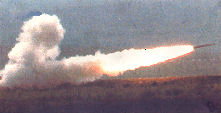Military rockets: health warning
The Northumberland National Park is home to many rare species of animal, as well as 2,000 people. Much of it is owned by the Ministry of Defence, whose activities are carefully monitored by locals. In 1997, one resident gathered evidence suggesting that planned military training in the area was about to cause considerable damage to health and local wildlife. ASK refuted much of this claim at a public inquiry, but endorsed one aspect.
The case:
The controversy revolved around the MoD’s plans to train soldiers in the use of rocketry whose exhaust contains hydrogen chloride in large concentration. Hydrogen chloride is an acid; a corrosive gas, which can burn skin and, at lower concentrations, will cause coughing and choking if inhaled. The resident asserted in his report that training activities would cause dangerous levels of the gas to be released, which would impact on communities and wildlife over a wide radius.
 ASK's involvement:
ASK's involvement:
ASK developed a method for predicting how the gas would spread within the park and the concentrations it would reach at various distances from the training site. We used video footage to model the shape and dimensions of gas clouds emitted by the rockets and input the resulting data into a dispersion model.
The result:
We proved that, under normal conditions, there was no significant risk to the general public or the environment. Direct measurements of hydrogen chloride concentrations within the cloud confirmed that the model predictions were conservative.
However, our model also showed that, if rockets were fired many times in quick succession above light snow cover, especially in calm conditions, local vegetation could be exposed to “acid shock” after a thaw. The MoD therefore agreed not to fire salvos under these circumstances.
Read other case studies
